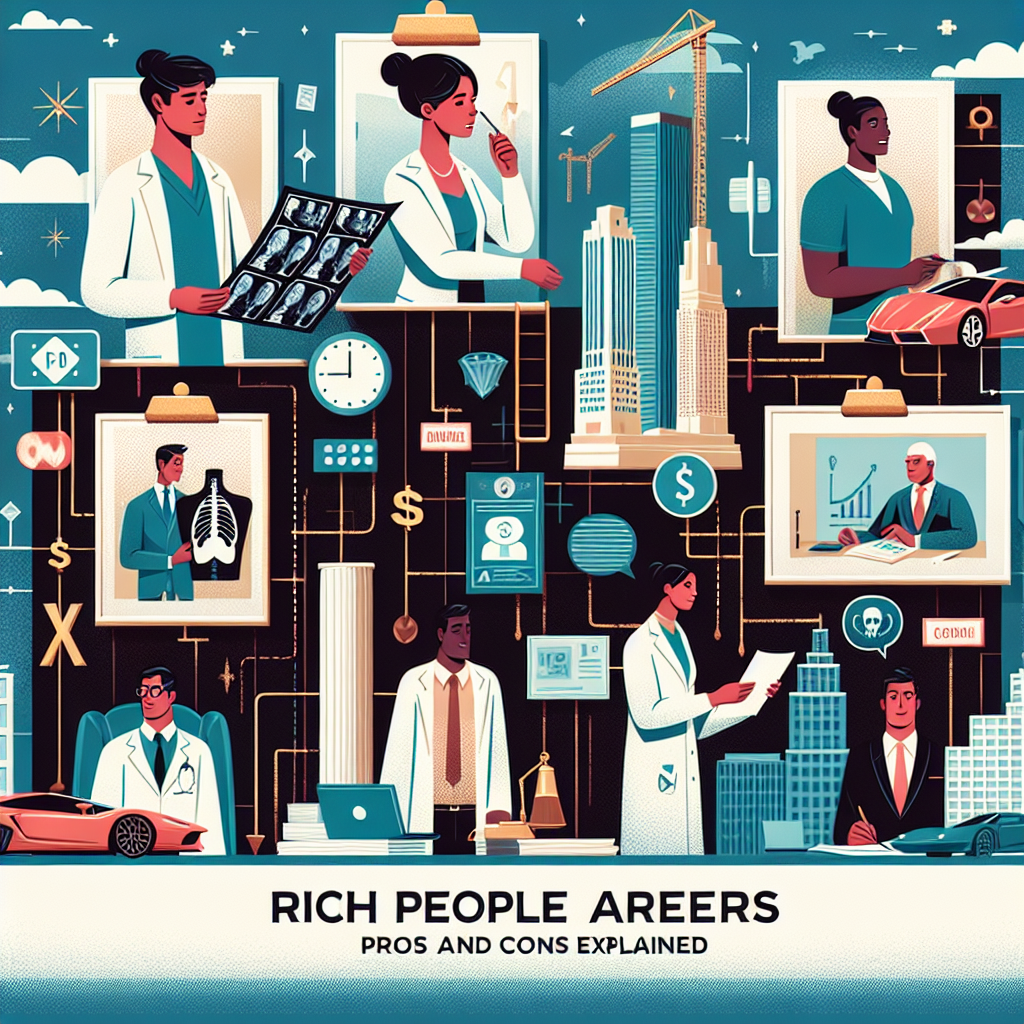Choosing a career associated with exceptional wealth can seem attractive: high pay, status, access to exclusive networks. Rich People Careers: Pros and Cons Explained will help you weigh what those advantages actually look like in daily life, and what trade-offs come with aiming for the top of the income ladder. Whether you’re early in your career or considering a late pivot, understanding the realities of affluent professions helps set realistic goals and avoid common pitfalls.
Careers of the Wealthy: Pros and Cons
Jobs that lead to substantial wealth — such as finance executives, tech founders, top surgeons, or high-end legal partners — share certain benefits and drawbacks. On the plus side, they often deliver financial security, resources to invest or donate, and social influence. On the downside, they may demand long hours, high stress, and exposure to volatile markets or reputational risks.
Common advantages
- Significantly higher earning potential compared with median jobs.
- Access to premium benefits, private networks, and investment opportunities.
- Greater ability to shape personal time, hire support, and pursue philanthropic goals.
Common disadvantages
- High responsibility and pressure to perform consistently at elite levels.
- Work-life balance can suffer; personal relationships may be strained.
- Increased public scrutiny and regulatory or legal exposure in some fields.
How lifestyle and expectations differ
Affluent careers typically bring lifestyle changes that go beyond bank balances. Many people in top-income roles find themselves surrounded by a culture of optimization — constant networking, continuing education, and image management. This environment rewards continual growth but can also create a sense of relentless comparison. Recognizing that lifestyle inflation is a natural consequence of higher pay helps you plan finances and priorities more intentionally.
Paths into high-earning roles
There are multiple routes into lucrative careers: formal professional training (medicine, law), climbing corporate ladders (C-suite roles), entrepreneurship (founders and early employees in startups), and specialized creative or technical mastery. The timeline and risks vary: entrepreneurship offers rapid upside but high failure risk, while professions like medicine offer slower, steadier returns after long training periods.
If you’re contemplating a change later in life, it’s valuable to explore resources tailored to that stage. For example, guidance on starting fresh—new career paths for women at 50 can illustrate practical steps and mindset shifts that apply to many midlife career pivots, including aiming for higher-paying roles.
Financial and psychological trade-offs
Pursuing a rich-person career often means accepting trade-offs. Financially, higher income usually translates into more complex tax planning, wealth management, and estate considerations. Psychologically, the stakes can impact mental health — anxiety about maintaining status, fear of failure, and isolation from peers. Planning ahead with financial advisors and mental health professionals is a common strategy among top earners.
Risk management strategies
- Diversify income streams: investments, passive income, and side businesses.
- Establish a financial plan with emergency savings, retirement funding, and tax-efficient strategies.
- Invest in professional development while protecting personal well-being through boundaries and support systems.
What labor data suggests
Labor statistics and occupational outlooks can help set expectations about demand, wages, and job growth in high-earning fields. The U.S. Bureau of Labor Statistics provides industry-specific projections and typical education and credential requirements, which are useful when evaluating long-term prospects for affluent occupations. See the U.S. Bureau of Labor Statistics Occupational Outlook Handbook for detailed profiles of many high-pay professions.
U.S. Bureau of Labor Statistics Occupational Outlook Handbook
Practical questions to ask before committing
- Am I drawn to the work itself or primarily to the financial rewards?
- What training, credentials, or risk tolerance are required to enter this field?
- How will pursuing this career affect my relationships, health, and long-term goals?
Short checklist to get started
- Research income ranges and typical career paths for roles that interest you.
- Speak with mentors or people currently in the role to learn daily realities.
- Create a 3–5 year plan with milestones for skills, credentials, and networking.
FAQ
Q: Are rich-person careers always worth the sacrifices?
A: That depends on your values. For some, financial security and influence are worth the trade-offs; others prioritize flexibility and wellbeing. Clarify personal priorities before deciding.
Q: Can you switch into a high-paying career later in life?
A: Yes—many people make successful late transitions, though the path may require added planning, re-skilling, and realistic expectations about timelines.
Q: How should I evaluate whether a high-earning role is a good fit?
A: Assess daily tasks, work environment, long-term prospects, and alignment with personal values. Talk to professionals in the field and, if possible, try short-term projects or part-time training to test fit.



